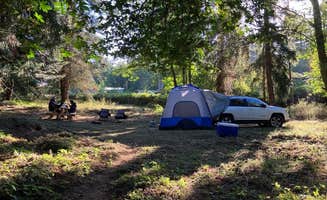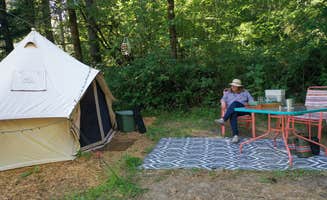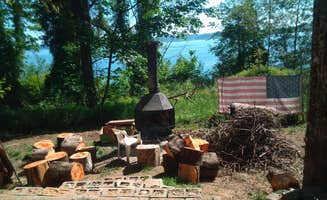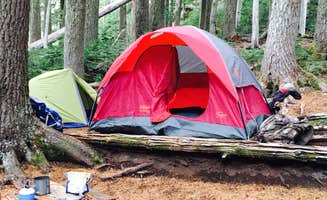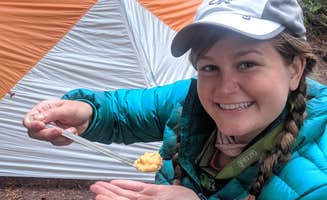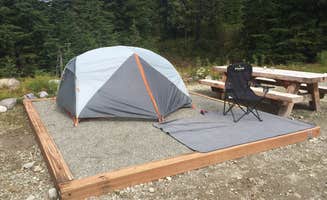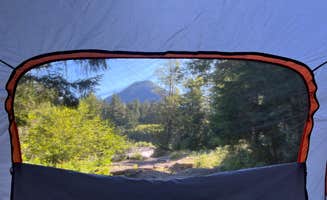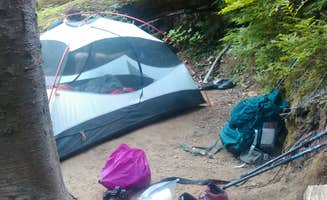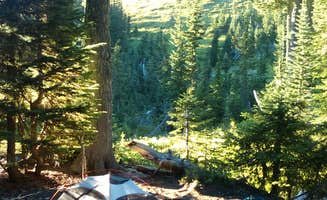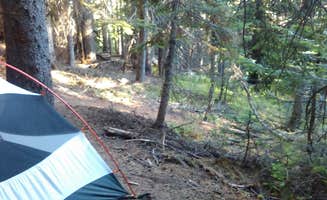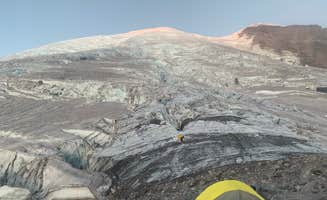Tent camping near McKenna, Washington offers numerous primitive and backcountry options within the Mount Rainier forest ecosystem. Located approximately 40 miles southeast of Olympia, campsites range from 500 to 5,000 feet elevation with overnight temperatures dropping significantly even in summer months. The terrain features mixed conifer forests dominated by Douglas fir, western hemlock, and western red cedar, creating distinct camping environments across the region.
What to do
Waterfall exploration: 2-mile hike from Mowich Lake Campground to nearby cascades provides family-friendly adventure during summer months. "The lake is this amazingly clear, turquoise blue. You can see the fallen dead wood sitting at the bottom of the lake. Hiking into the alpine was too beautiful for words," notes camper Maria P.
Wildlife observation: Unique encounter options at select camping areas permit close animal interaction. At The Healing Farm, campers can participate in feeding and care routines. "We gathered eggs, milked goats, fed a porcupine and capybaras, cuddled baby bunnies, met a joey in a pouch, hung out with emus, and even snuggled with goats," shares one camper.
Fishing access: Multiple camping areas feature river or stream proximity for recreational fishing. White River Dispersed Camping provides direct shoreline access where some campers report catching rainbow and brook trout. "We found a spot right next to the river. There were a few other people, but everyone was very quiet," reports Corbanzo B.
What campers like
Privacy despite proximity: Sites at Eagles Roost Camp balance communal camping with personal space. "While you can be fairly close to fellow campers, you still get a good sense of privacy. Sites are spaced out nicely from each other," writes Danielle S., who appreciates the separation between sites.
Natural sound barriers: Rushing water creates ambient noise that masks nearby campers. At Eagles Roost Camp, "with the waterfall close by there is constant white noise that while not overpowering it drowns out any neighbors," according to reviewer Kier S.
Hammock camping options: Many sites accommodate alternative sleeping setups beyond traditional tents. "You could make 1 hammock work at most of the sites, but we had 2 and we were very glad we arrived at an empty campground and had our pick. We chose site 4 and made it work," notes one Eagles Roost camper.
What you should know
Road conditions and access issues: Many primitive sites require navigating difficult forest roads. White River Dispersed Camping access "can be a bit of a challenging road, so low clearance vehicles wouldn't be treated well," according to reviewer P.J.
Site occupancy patterns: Weekday arrivals substantially improve camping options. "We arrived mid-afternoon on a Friday and there were plenty of options to pick from, but it did fill up by around 9pm," reports Michael F. about White River Dispersed.
Weather variability: Even summer camping requires cold-weather preparation at higher elevations. "Even in July there is snow and temperatures reached as low as 40F," notes Kasey about Mowich Lake Campground.
Tips for camping with families
Educational experiences: Select sites offer structured animal interactions. At Paradise Pines, "the wildlife (deer) that wandered through every morning was delightful," while other campsites feature more intentional animal programs.
Space considerations: Family camping requires sufficient flat terrain for multiple tents. "Our family loves staying in private camp sites. With little kids you really can't beat it!" notes Dara M. about Paradise Pines.
Safety boundaries: Sites near water require additional supervision. White River campsites demand caution as "it looks like the earth can erode and break away into the river (why the trees collapse)," warns Jada P.
Tips from RVers
Size restrictions: Most primitive sites near McKenna cannot accommodate large recreational vehicles. At Ipsut Creek Backcountry Campground, access has changed significantly: "Ipsut Creek Campground is an amazing treasure of Mount Rainier Park, accessible only by bicycle or foot after the road to access washed out a few years ago," explains Marley B.
Road clearance limitations: Forest service roads frequently pose challenges. "The road can be a bit thin, so I would be careful with extra large vehicles," advises P.J. regarding dispersed camping access.
Seasonal closures: Winter road conditions eliminate RV access to many sites. "The road closes in late fall and winter, so makes sure to schedule this in the summer," advises Drew W. about Ipsut Creek.


